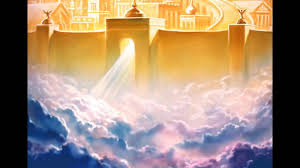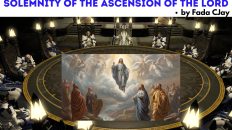“BEHOLD, I MAKE ALL THINGS NEW.”
(A
reflection on the apocalyptic message of the New Heavens and New Earth; with
Nigeria and Brazil as a case study)
reflection on the apocalyptic message of the New Heavens and New Earth; with
Nigeria and Brazil as a case study)
“The One who sat on the throne said, ‘Behold, I make all things new."
(Rev. 21:5)
Taking a look at the biblical
expression above, we discover that it has both eschatological and
apocalyptic character. Eschatological prophetic texts are those in which
the prophet and his disciples announce the hope of a salvific intervention
of Yahweh, favourable to God’s people and punishable to the enemies.
Eschatology which means “the last things” has its origin from the
Babylonian myths; others seek its origin within the biblical tradition. On
the other hand, the apocalyptic text emphasizes more on the divine origin of a
revelation and characterizes itself by literary techniques and used
images.
expression above, we discover that it has both eschatological and
apocalyptic character. Eschatological prophetic texts are those in which
the prophet and his disciples announce the hope of a salvific intervention
of Yahweh, favourable to God’s people and punishable to the enemies.
Eschatology which means “the last things” has its origin from the
Babylonian myths; others seek its origin within the biblical tradition. On
the other hand, the apocalyptic text emphasizes more on the divine origin of a
revelation and characterizes itself by literary techniques and used
images.
Hence, apocalyptic would be a more
recent and latest form of eschatology. When authors talk about
apocalyptic, some try to define what it means, while others prefer to
describe it. Taking the example of Ph. Vielhauer, he defines apocalyptic as
“the literary genre of the writings of revelation which reveals the sacred
of beyond, especially the end of times, together with the worldview and
the conceptions in general. Let us recall that the apocalyptic literature first
came to Judah at the beginning of the Post exile (538 B.C), when the
priestly elite of the people took up the political task and co-opted the
prophetical words (Ez, Ag, Zc, Ml).
recent and latest form of eschatology. When authors talk about
apocalyptic, some try to define what it means, while others prefer to
describe it. Taking the example of Ph. Vielhauer, he defines apocalyptic as
“the literary genre of the writings of revelation which reveals the sacred
of beyond, especially the end of times, together with the worldview and
the conceptions in general. Let us recall that the apocalyptic literature first
came to Judah at the beginning of the Post exile (538 B.C), when the
priestly elite of the people took up the political task and co-opted the
prophetical words (Ez, Ag, Zc, Ml).
Consequently, that prophecy was
weakened little by little and lost its strength. It later flourished,
during the Greek dominion (333 – 63BC); which sought to sustain the hope of the
people at that terrible moment of crises. Also during the Roman dominion
(63 BC – 135 AD), the apocalyptic hope did not cease to flourish. It was
represented in the New Testament by the book of Apocalypse. In other words, it
was under this period (about 70AD) that John wrote the book of Revelation;
little wonder the apocalyptic message flourished in a more dynamic manner
in his book. The language of the apocalyptic text as contained in the Old
Testament fills the hope in the immediate change of reality for divine
intervention “Behold, I will create new heavens and a new earth” (Is. 65:17).
weakened little by little and lost its strength. It later flourished,
during the Greek dominion (333 – 63BC); which sought to sustain the hope of the
people at that terrible moment of crises. Also during the Roman dominion
(63 BC – 135 AD), the apocalyptic hope did not cease to flourish. It was
represented in the New Testament by the book of Apocalypse. In other words, it
was under this period (about 70AD) that John wrote the book of Revelation;
little wonder the apocalyptic message flourished in a more dynamic manner
in his book. The language of the apocalyptic text as contained in the Old
Testament fills the hope in the immediate change of reality for divine
intervention “Behold, I will create new heavens and a new earth” (Is. 65:17).
Hence, the reality of this book is
not far-fetched when compared with the book of Revelation, in which a complete
renewal is envisaged, a new world is foretold as a return to paradise. Taking
a look at the Second reading (Rev. 21:1-5), John says: “I, John, saw a new
heaven and a new earth. The former heaven and the former
earth had passed away, and the sea was no more. I also saw the holy city, a
New Jerusalem, coming down out of heaven from God, prepared as a bride adorned
for her husband. I heard a loud voice from the throne saying:
‘Behold, God’s dwelling is with the human race. He will dwell with
them and they will be his people and God himself will always be with them
as their God. He will wipe every tear from their eyes, and there shall be
no more death or mourning, wailing or pain, for the old order has passed
away’”.
not far-fetched when compared with the book of Revelation, in which a complete
renewal is envisaged, a new world is foretold as a return to paradise. Taking
a look at the Second reading (Rev. 21:1-5), John says: “I, John, saw a new
heaven and a new earth. The former heaven and the former
earth had passed away, and the sea was no more. I also saw the holy city, a
New Jerusalem, coming down out of heaven from God, prepared as a bride adorned
for her husband. I heard a loud voice from the throne saying:
‘Behold, God’s dwelling is with the human race. He will dwell with
them and they will be his people and God himself will always be with them
as their God. He will wipe every tear from their eyes, and there shall be
no more death or mourning, wailing or pain, for the old order has passed
away’”.
From the foregoing, dear friends,
God is presented as the protector and liberator of the poor, and commands his
people to do the same. Hence, we can say in effect that it was from suffering
that dream was born. This situation seeks to bring a kind of utopia, a world of
justice and peace where things are done according to the law of God, a kind of
paradise. The word “New heaven” is used to signify the totality of the
universe, which includes the institution and the organization of the world (cf.
Jr. 33:25). Consequently, the expression “to create new earth” indicates to
create new social order which implies an abundance of life for the poor and for
the faithful of the Law. In this way, we see the intervention of God. Thus, out
of a conflictive situation the dream of a new heaven and a new earth was
proposed.
God is presented as the protector and liberator of the poor, and commands his
people to do the same. Hence, we can say in effect that it was from suffering
that dream was born. This situation seeks to bring a kind of utopia, a world of
justice and peace where things are done according to the law of God, a kind of
paradise. The word “New heaven” is used to signify the totality of the
universe, which includes the institution and the organization of the world (cf.
Jr. 33:25). Consequently, the expression “to create new earth” indicates to
create new social order which implies an abundance of life for the poor and for
the faithful of the Law. In this way, we see the intervention of God. Thus, out
of a conflictive situation the dream of a new heaven and a new earth was
proposed.
Today we live in a society which
appears to be weighed down not only by uncertainties, but also by moral,
economic and political problems. This apocalyptic message is basically meant
for us in our days. Unfortunately, we are faced with paradoxical realities of
life as regards the socioeconomic situations in the society. Both Nigeria and
Brazil for example, have a very strong economy and no doubts, very rich
countries, but the majorities of the people are drowned in the ocean of
poverty, sickness, famine and victims of violence (with respect to the menace
of Boko Haram).
appears to be weighed down not only by uncertainties, but also by moral,
economic and political problems. This apocalyptic message is basically meant
for us in our days. Unfortunately, we are faced with paradoxical realities of
life as regards the socioeconomic situations in the society. Both Nigeria and
Brazil for example, have a very strong economy and no doubts, very rich
countries, but the majorities of the people are drowned in the ocean of
poverty, sickness, famine and victims of violence (with respect to the menace
of Boko Haram).
Nigeria contains an interesting
paradox – due to its oil reserve, it is Africa’s largest economy, but 70% of
Nigerians live under the international poverty line of US $1.25 a day.
The majority of Nigerians live without indoor plumbing and electricity,
and many lack access to clean water and sanitation facilities. This lack
of infrastructure helps explain Nigeria’s high infant mortality rate – ranking
the ninth highest of all countries. A few more statistics give a brief
outline of the birth to death experiences: a full 24% Nigerians age 5-14 are
involved in child labor, just to mention a few.
paradox – due to its oil reserve, it is Africa’s largest economy, but 70% of
Nigerians live under the international poverty line of US $1.25 a day.
The majority of Nigerians live without indoor plumbing and electricity,
and many lack access to clean water and sanitation facilities. This lack
of infrastructure helps explain Nigeria’s high infant mortality rate – ranking
the ninth highest of all countries. A few more statistics give a brief
outline of the birth to death experiences: a full 24% Nigerians age 5-14 are
involved in child labor, just to mention a few.
Brazil on the other hand, Brazil has
experienced phenomenal economic growth in the last decade. It now ranks number
7 or 8 largest economy in the world, second largest in the Western Hemisphere
behind the US. Unfortunately, corruption has prevented the citizens from
enjoying the fruits of the land; the cost of living is high, lots of homeless
people are seen sleeping in the streets at night, poverty sweeps across the
lives of the majority, some are affected with sickness of one kind or the
other, and the cry of impeachment of its leaders is loudly heard from the ends
of the earth… just to mention a few.
experienced phenomenal economic growth in the last decade. It now ranks number
7 or 8 largest economy in the world, second largest in the Western Hemisphere
behind the US. Unfortunately, corruption has prevented the citizens from
enjoying the fruits of the land; the cost of living is high, lots of homeless
people are seen sleeping in the streets at night, poverty sweeps across the
lives of the majority, some are affected with sickness of one kind or the
other, and the cry of impeachment of its leaders is loudly heard from the ends
of the earth… just to mention a few.
The message of today is not out of
place here. Put differently, it fits in perfectly. In this vein, the leaders
and the people, that is, those in authority who steal from the people which the
bible describes as the “wolf” will live together in harmony with the suffering
people (the lambs); the veracious lion would not kill the ox, etc. This brings
a new hope for us. The One who sits on the throne says: “I will make all things
new”.
place here. Put differently, it fits in perfectly. In this vein, the leaders
and the people, that is, those in authority who steal from the people which the
bible describes as the “wolf” will live together in harmony with the suffering
people (the lambs); the veracious lion would not kill the ox, etc. This brings
a new hope for us. The One who sits on the throne says: “I will make all things
new”.
Dear friends, this apocalyptic
proposal is real and concrete, for it seeks to bring about an “utopian
society”. Hence, inasmuch as the message of
creating “new heavens and a new earth” refers to the end of times,
however, the project commences now. It begins with you and I. To achieve
this goal, the Gospel of today presents a splendid way: “I give you a
new commandment: love one another” (Jn. 13.34): the new world begins with
mutual love, that which Jesus gave to us, thus building the “New
Jerusalem” (Ap. 21,2) where we will have the dwelling of God among men.
(Rev. 21.3).
proposal is real and concrete, for it seeks to bring about an “utopian
society”. Hence, inasmuch as the message of
creating “new heavens and a new earth” refers to the end of times,
however, the project commences now. It begins with you and I. To achieve
this goal, the Gospel of today presents a splendid way: “I give you a
new commandment: love one another” (Jn. 13.34): the new world begins with
mutual love, that which Jesus gave to us, thus building the “New
Jerusalem” (Ap. 21,2) where we will have the dwelling of God among men.
(Rev. 21.3).
However, beautiful, this message
has its costs which the First Reading from the Acts of the Apostles (14:21-27)
presents to us: a firm faith, know how to accept suffering, trust in God,
and prayers. This project costs a lot. It does not hang on the government alone
nor on the citizens alone, but on everyone. This calls for mutual love,
cooperation and understanding if we must realize this project. It is when
we have realized this that we can exclaim like the psalmist of today: “I will
praise your name forever, my King, and my God.” (Ps.145).
has its costs which the First Reading from the Acts of the Apostles (14:21-27)
presents to us: a firm faith, know how to accept suffering, trust in God,
and prayers. This project costs a lot. It does not hang on the government alone
nor on the citizens alone, but on everyone. This calls for mutual love,
cooperation and understanding if we must realize this project. It is when
we have realized this that we can exclaim like the psalmist of today: “I will
praise your name forever, my King, and my God.” (Ps.145).
May the resurrected Lord who creates anew and listens to
the cries of his people continue to be our strength in adversity, our health in
weakness, our comfort in sorrow. We ask him to be merciful to us his
people and spare society from chaos, anarchy and doom. Above all, may He
bless us with his kingdom of Justice, Love and Peace. Amen.
the cries of his people continue to be our strength in adversity, our health in
weakness, our comfort in sorrow. We ask him to be merciful to us his
people and spare society from chaos, anarchy and doom. Above all, may He
bless us with his kingdom of Justice, Love and Peace. Amen.
HAPPY 5TH SUNDAY OF EASTER, YEAR C!!!
(CLICK HERE ALSO TO READ: "WHAT IS THE CONNECTION BETWEEN
THE GOOD SHEPHERD SUNDAY AND THE VOCATION SUNDAY WITH
BIBLICAL ILLUSTRATIONS")





